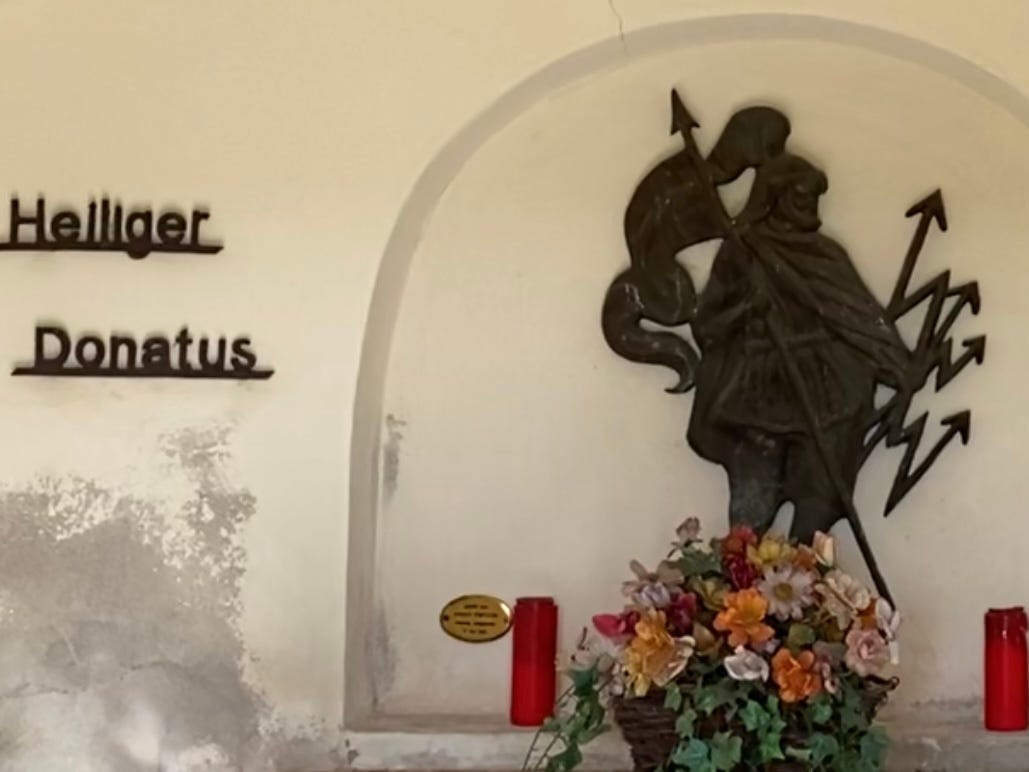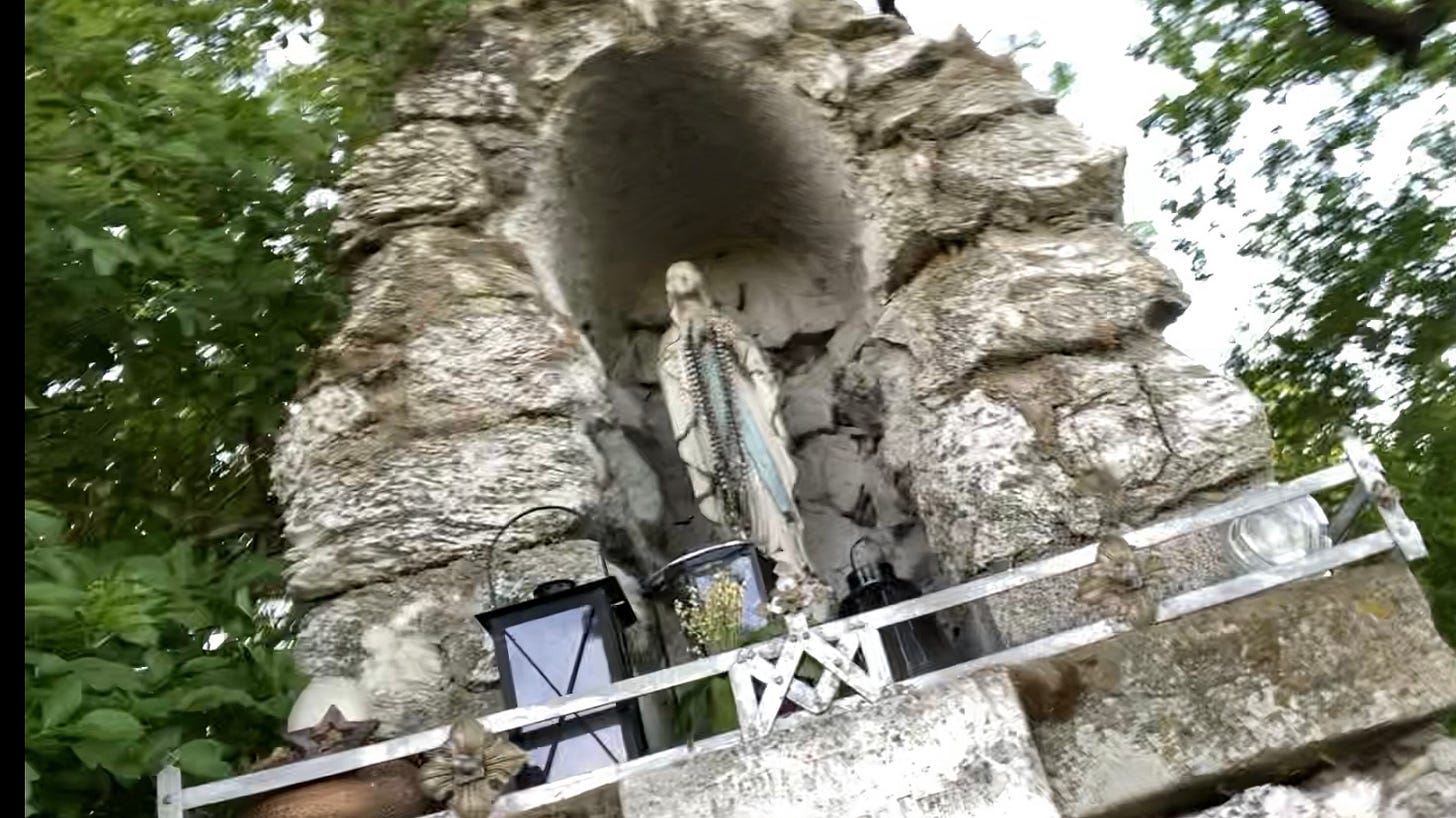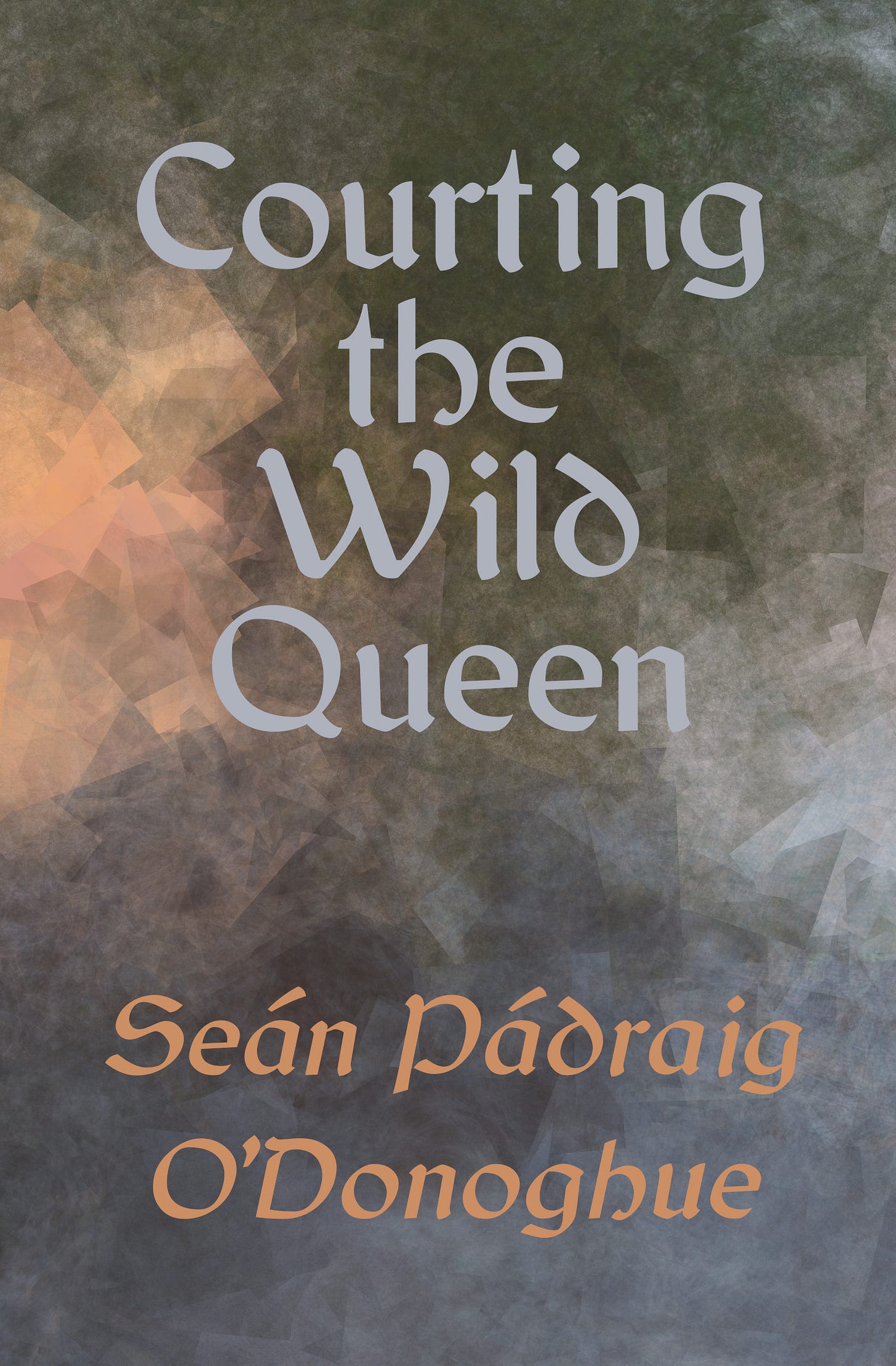Digitally Seeking Solace
A solstice letter from the Forests of Arduinna
Today is the solstice.
The last few days we had quite a significant wave of heat. Not nearly as bad as what those in the forests of Vosges experienced nearby, nor what those across the Atlantic are experiencing. Regardless, it was bitterly hot.
My husband and I live in a rather large old house that requires some bit of work to keep from getting too hot. Of course, this is old knowledge, the sort of knowledge people hundreds of years ago understood but the sort lost to many in urban places now. You have to open and close windows and shutters at certain times and pattern your activities to the heat cycle of the day. A bit like the inverse of keeping an old house warm, sealing off certain rooms completely and avoiding ever opening the door of the warm rooms unless absolutely necessary.
Now, most people just flip a switch or tap something on a device and everything is the temperature you want it to be. That all sounds great (and it was when I lived in places with central air and cooling systems in the US), but it’s also of course part of the reason why the world’s all out of balance.
Anyway, I’m not much for extreme heat, especially if I’ve work to do (I did), and my mood had quite soured until the last night of it. After several days and nights of feeling stifled, the sky broke in great thunderous peals and one of the most beautiful displays of lightning I’ve seen in almost a decade. The wind rose up fast, shaking the great oak next to our home with such force the cattle running for its shelter seemed to hesitate. Immediately, all was well again, life and dreams and thought all felt possible.
Coming along so near the solstice, that storm felt sacred and more portentous than it might have otherwise. I wrote before about how the few days on either side of the stations of the year feel much like the moments on a bike just before and just after you change a gear. It’s a fitting metaphor for this time as well.
It’s taken me quite some time to regain myself after the extreme work of that manuscript. It wasn’t of course just the manuscript itself, but more specifically the mindset I had to enter in order to write it. Though I’d otherwise stopped reading social media, I needed to re-engage with those despair pits for research on the increasing extremism of Woke Ideology.
Extremism is the correct word here, and it’s something I’ve not really liked looking at directly. What seemed at first as a mere derailment or misguided confusion instead increasingly reveals itself as something really quite fanatical. Particularly worrisome is the lengths to which those who believe they are fighting for justice will go and urge others to do the same.
On an anarchist forum the other day, I read about vandalism and arson against churches who run pregnancy counseling services which do not include abortion. They all applauded each other for their acts of liberation and exhorted others to take inspiration. Attacking abortion providers and vandalizing their buildings “in defense of the unborn” is a rather renowned extreme right act that almost everyone agreed wasn’t cool. Now, it’s apparently cool to do the same thing against people who don’t provide abortions as long as you say it’s “in defense of women.”
This same logic appears throughout Woke Ideology, and it’s getting more extreme. I’m hoping that one effect of the book I wrote on the subject will be to help the left push back against these trends and to fully separate itself from the ideological forms which fuel it. This isn’t easy, of course, since everyone outside of the left thinks that Woke Ideology is leftist, which is how the Woke would have it. And unfortunately, those who do consider themselves left are terrified to challenge Woke Ideology publicly for fear of becoming the next target of the mobs.
Over those months researching the book, I kept noticing that many people I’d once held close to my heart now speak of the world in ways I cannot understand any longer. Their language is terrifying, their dogmatism turned fundamentalist, and the particular targets of their rage are others on “the left” whom they decry as no better than concentration camp guards.
It’s hard to read all of that and to still hold space for the utter fear and personal misery which such rhetoric conceals. None of those aforementioned have anything approximating stable lives. Some of them are often suicidal, many of them are constantly in dire financial straits and are constantly begging for donations to fund such extravagant endeavors as buying groceries and paying their rent. Their social media posts cycle from screaming about injustice and warning about rising fascism to complaining about lack of community, the cost of daily life, and their sense that no one cares about them. It’s all quite bipolar: one day they’re writing screeds against “cis-men” and the gender binary, the next day they’re complaining about how they cannot get a date and they feel deeply lonely.
The most radical of my former friends, the ones most devoted to changing the world and shaking from the thrones of the earth all the false gods that oppress them, have always also been the most unhappy. Their relationships are always unstable, their family a source of constant antagonism and pain. I think of one, constantly bemoaning how hard it is to raise a child on her own. For her, the most urgent problem in the world is rising fascism and misogyny. Another, who suffers constantly from poor self-image even more so after transition than before, who always needs to fund raise for rent, spends hours online attacking lesbians for their transphobia. A third, renowned for her relentless screeds against able-ism and white supremacy, now crowdfunds a housekeeper because she is, in her own words, “too fat” to tidy her apartment.
Of course it’s all related. Underlying health, money, and mental issues (in Marxist terms, “material conditions”) lead people to extreme behavior and make them much more amenable to joining mass political movements. Someone or something must be to blame, because though we all pretend no one believes in gods anymore, we all act as if there are external agents behind all our misery who, once finally named, must be made to yield to our prayers.
Of course those gods now are structures and disorders, but it seemed a lot more honest when we just called them gods and admitted that we needed help, were sometimes sick, scared, sad, and confused, and definitely didn’t have all the answers.
I fear they’ll get more extreme, and I’m beginning to understand there’s nothing I can do to change this. They’ll figure it out or they won’t, they’ll learn to be happy or they’ll scream perpetually into the digital void. They’ll of course harm plenty of people on their way regardless their eventual choice, but that’s not something anyone can stop.
The land behind my house rises quite sharply upward towards a plateau upon which the Huns, led by Attila, once camped. At that spot is a strange chapel that none of the priests I’ve spoken to (and that’s a good handful of them, because of course a Druid needs to have good relations with the Catholic priests here) seem to know anything about.
The chapel is dedicated to St. Donatus of Münstereifel. Known more commonly here as Donat, he was quite a popular saint amongst the Franks for an easily understood reason. His local name is pronounced the same as the god of thunder, Donar; Donatus is a patron saint of protection from lightning strikes. The Franks who settled here in the Ardennes could continue reverence to one of their old gods while appearing to be faithful to the new religion.
There is a peculiarly pagan feel to this chapel, particularly because of one important detail in the depiction of Donatus. He is normally shown stopping a bolt of lightning just before it strikes the earth: in this one, he is instead wielding the lightning.
Not far from that shrine is an ancient healing oak with a virgin shrine. I brought my husband there, as he’d never seen it, and we lit candles for a friend of ours whose daughter is on her fourth pregnancy after three miscarriages. The local priest could tell me nothing about the shrine—in fact, he hadn’t even known it was there, which leads me to conclude that the local pagan Druid knows more about what the lay Catholics are up to than their priest does.
The shrine is likely at least a hundred years old, possibly older. The massive oak in front of which it was built is at least 500 years old but maybe much older still. It’s hard to be certain, but from the patterns of its branches it may have once been struck by lightning: such oaks were sacred both to the Franks and the Celts who lived here in the Ardennes and used as sites of reverence to gods of lightning. Later, Catholics built shrines in front of (and sometimes inside of) such trees to the virgin so that offerings and prayers could still be made at the tree, just in someone else’s name.
Years ago, in all my fervor, I thought it mattered whose name those prayers were being made in. The local priest still believes as I once did, and bristles greatly at the obvious pagan continuities in such places despite admitting their existence.
From the very same perspective which looks at the miserable material conditions of many of my Woke former friends, whom these people are actually praying to doesn’t really matter. People are walking to an ancient tree, crying for their sick and pained loved ones, asking for a miracle. They pray now to the virgin at the tree, they prayed before to a god at the tree, but regardless they prayed at the tree.
The Woke are no less religious than the faithful. Unfortunately, their supplications are not uttered before trees and shrines but at machines they hold in their hands. They chant litanies about oppression and injustice, but are really crying out “hear my sorrow, heal my pain, right this wrong.” Yet unlike those who light candles to the virgin at the tree or leave offerings to a saint on a lightning-strewn high place, their prayers can only ever be echoed back by others digitally seeking the same solace.
A Brief Re-Introduction
Since I last wrote a re-introduction to my writing and to From The Forests of Arduinna, several hundred more people are reading me. So it’s time for another one.
First of all, I’m Rhyd Wildermuth. I was born in the United States but now live in Luxembourg. The name of this Substack comes from the history of the place where I live: Arduinna is the name of the Celtic goddess after which all these forests were named, which later became known as Ardennes.
I’m what you might call “post-woke,” or as one of my favorite writers Paul Kingsnorth recently described me, a “recovering US ‘progressive.’” More specifically, I was an anarchist and activist for 20 years in America, and though I still consider myself a leftist (Marxist specifically), I’m highly critical of what calls itself the left in the US.
I recently wrote a book that will be published likely early next year. It’s specifically on the problems of Woke Ideology from the perspective of the left, rather than the tired old critiques from the right. Excerpts of the manuscript can be found scattered throughout the archive of this Substack.
I’m also pagan, and this particularly shapes my perspective on politics. If you’re not a pagan, don’t worry—I think at least a thousand of so of your fellow subscribing readers aren’t either.
I’ve written six other books besides the upcoming one on Woke Ideology. If you’re interested in what I mean by pagan (you might be quite surprised and maybe even consider yourself one as well after reading it), you’d enjoy my latest book, Being Pagan. If you’re interested in why I think Marxist class and material analysis is deeply relevant, you’d like All That Is Sacred is Profane, my short guide to Marx from an animist perspective. And if erotic fantasy fiction interests you at all, The Provisioner might be your thing.
Income from this Substack now comprises the majority of my monthly income, along with book royalties and a small stipend from my publishing work and book royalties. Paid supporters get access to at least two paywalled essays per month and the entire archive of previous paywalled essays (including manuscript excerpts). Free subscribers always get previews of these essays and plenty of free essays as well.
If you’re interested in becoming a paid supporter, you can do so below.
Updates
In the next few months, I’ll be starting several new projects here and returning to others that fell by the wayside on account of working on that manuscript.
First of all, I’ll be starting a new monthly audio podcast, which I’ll announce next month. Secondly, I’ll begin my occasional druid journal video series, a project that I’ve deeply enjoyed but had little time for lately. Also, I’ll be working again on an old fiction manuscript over the next few months and pitching it. I will probably begin publishing excerpts of it for paid supporters as I did for my manuscript on Woke Ideology.
One thing I could use help on from you all is finding an agent. If any of you work as one or know one that you think might work well for me, I’d greatly appreciate hearing from you.
As you maybe also know, I’m the director of publishing for Ritona (also called Gods&Radicals Press). We just released a book today by a writer some of you probably already know: Courting the Wild Queen, by poet, herbalist, and mystic Seán Pádraig O'Donoghue.
We’ve another book coming later this year that I think will be of particular interest to most of you. It’s called The White Deer, by Melinda Redinger. It’s a joyous and fascinating romp through myth, history, science, spirituality, and deep ecology focused on the figure of the rare white deer. A fun and tantalizing teaser for you: Archduke Ferdinand, the fool whose death triggered World War I, had earlier that year killed a white deer. A common hunter’s taboo in Europe states that killing a white deer means you’ll die within a year, and Ferdinand believed it.
Also, I am always looking for more books to publish, so if you have a manuscript you think might interest me, send me an email.
Thanks as always for reading me, and be always well!
—Rhyd Wildermuth







Yes. Yes. Yes. Just here to let you know that I am quietly reading, appreciating, and agreeing with you. And, your writing is stunning.
Beautiful! Honesty and compassion perfectly woven 🙏🏼🧡🙏🏼